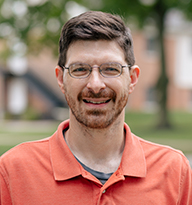Lancaster Bible College’s Arts & Sciences Department designed the Christian Thought in the Humanities program to provide students with a degree that deepens their understanding of God and broadens their understanding of humanity. The major takes advantage of the disciplines already part of the Arts & Sciences core curriculum while offering students the opportunity to dig deeper into courses that help them see the world, its cultures, its societies, and its people according to the light of Scripture.
 “The Bible isn’t just an add-on or one text among many,” said Dr. Geoffrey Reiter, Program Coordinator for Christian Thought in the Humanities as well as Associate Professor and Coordinator of Literature. “At LBC, the Bible remains the centerpiece of our thinking. That’s not true for secular institutions, and even some Christian Humanities programs might not emphasize Scripture’s centrality the way we do.”
“The Bible isn’t just an add-on or one text among many,” said Dr. Geoffrey Reiter, Program Coordinator for Christian Thought in the Humanities as well as Associate Professor and Coordinator of Literature. “At LBC, the Bible remains the centerpiece of our thinking. That’s not true for secular institutions, and even some Christian Humanities programs might not emphasize Scripture’s centrality the way we do.”
This program allows students the opportunity to work toward a bachelor’s degree on LBC’s Lancaster, Pa., campus and offers three areas of specialization: Literature, Rhetoric & Writing and History.
“This major is built for people who have a desire to serve people like Christ using their passions for history, literature, or writing,” explained Kristin Webster (’25), a current student in the program. “This major is one of the more flexible majors at LBC, so if you have one or all of those passions, this may be a good fit for you. I am taking the writing route within this department, and something I appreciate is that I know I will use writing for the rest of my life, making it very practical.”
Reiter elaborated on the practicality of the Christian Thought in the Humanities program at LBC. “All students will study both broadly and deeply, but the program has three specializations,” he said. “It also includes practical components to help students translate their education into a variety of possible career fields.”
The program prepares students for careers as educators, technical writers, editors, copywriters, archivists, public relations professionals, politicians and more. It also readies students looking to continue their education in graduate-level programs.
Webster said she appreciates seeing how God is stretching her outside of her comfort zone through her writing specialization. “Originally, all I mostly wrote was poetry,” she said. “I appreciate how God is showing me ways I can serve Him and others through different writing styles such as business emails, scripts, short stories and soft news articles.”
The Christian Thought in the Humanities program seeks to cultivate students through the study of human thought, culture, and artifacts. Students will learn to see God as the author of human creation and the love of God as the ultimate purpose for studying human creation. By graduation, students will be prepared to:
- Employ reasonable thought and argumentation in evaluating human culture.
- Articulate an understanding of how and why God is the final object of human thought, expression, and creativity.
- Develop a biblical framework for understanding and evaluating the virtues of human culture.
- Cultivate an appreciation of the diversity and dignity of human beings as well as their weaknesses and flaws.
- Understand the self and others in light of cultural artifacts and masterpieces.
“LBC combines a counterculturally robust biblical worldview with a solid grounding in the liberal arts as a groundwork upon which students can work to excel at their chosen professions to the glory of Jesus Christ,” said Reiter.
A few sample core courses for students in the program include Survey of Classical Rhetoric to Modern Contexts, Instructional Design, Philosophy of Religion, Evolution/Creation – Chance or Design, and Cultivating Christian Thought in the Humanities.
Webster, who will be the program’s first graduate, expressed that her experience has been a great one. “My major is very flexible, and it gives me the opportunity to be creative, yet people-oriented at the same time,” she explained. “Even though the Humanities major is new, my advisors have done a great job of working with me and supporting me. I feel cared for and encouraged as well.”
What can students expect in this program? “Students can expect to be challenged in their thinking,” stated Reiter, “to look around them at creation and humanity to find bigger questions to ask, and then to see the ways in which their faith equips them to respond. This program will help them develop awe and wonder in light of God’s world.”
Reiter has enjoyed the work that went into creating and designing the new program, as well as the research that helped with developing the courses. “The rise in Christian secondary education, especially classically oriented Christian education, shows that there is a real interest in the kind of thing we’re doing,” he said. “I don’t know if many students know a program like this exists at Lancaster Bible College, and if they did, they could get as excited about it as I am.”